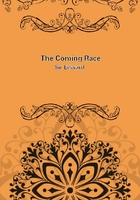
第40章
As Taee and myself, on quitting the town, and leaving to the left the main road which led to it, struck into the fields, the strange and solemn beauty of the landscape, lighted up, by numberless lamps, to the verge of the horizon, fascinated my eyes, and rendered me for some time an inattentive listener to the talk of my companion.
Along our way various operations of agriculture were being carried on by machinery, the forms of which were new to me, and for the most part very graceful; for among these people art being so cultivated for the sake of mere utility, exhibits itself in adorning or refining the shapes of useful objects. Precious metals and gems are so profuse among them, that they are lavished on things devoted to purposes the most 92commonplace; and their love of utility leads them to beautify its tools, and quickens their imagination in a way unknown to themselves.
In all service, whether in or out of doors, they make great use of automaton figures, which are so ingenious, and so pliant to the operations of vril, that they actually seem gifted with reason. It was scarcely possible to distinguish the figures I beheld, apparently guiding or superintending the rapid movements of vast engines, from human forms endowed with thought.
By degrees, as we continued to walk on, my attention became roused by the lively and acute remarks of my companion. The intelligence of the children among this race is marvellously precocious, perhaps from the habit of having intrusted to them, at so early an age, the toils and responsibilities of middle age. Indeed, in conversing with Taee, I felt as if talking with some superior and observant man of my own years. I asked him if he could form any estimate of the number of communities into which the race of the Vril-ya is subdivided.
"Not exactly," he said, "because they multiply, of course, every year as the surplus of each community is drafted off. But I heard my father say that, according to the last report,there were a million and a half of communities speaking our language, and adopting our institutions and forms of life and government; but, I believe, with some differences, aboutwhich you had better ask Zee. She knows more than most of the Ana do. An An cares less for things that do not concern him than a Gy does; the Gy-ei are inquisitive creatures.""Does each community restrict itself to the same number of families or amount of population that you do?""No; some have much smaller populations, some have larger- varying according to the extent of the country they appropriate, or to the degree of excellence to which they have brought their machinery. Each community sets its own limit according to circumstances, taking care always that there shall 93never arise any class of poor by the pressure of population upon the productive powers of the domain; and that no state shall be too large for a government resembling that of a single well-ordered family. I imagine that no vril community exceeds thirty-thousand households. But, as a general rule, the smaller the community, provided there be hands enough to do justice to the capacities of the territory it occupies, the richer each individual is, and the larger the sum contributed to the general treasury,- above all, the happier and the more tranquil is the whole political body, and the more perfect the products of its industry. The state which all tribes of the Vril-ya acknowledge to be the highest in civilisation, and which has brought the vril force to its fullest development, is perhaps the smallest. It limits itself to four thousand families; but every inch of its territory is cultivated to the utmost perfection of garden ground; its machinery excels that of every other tribe, and there is no product of its industry in any department which is not sought for, at extraordinary prices, by each community of our race. All our tribes make this state their model, considering that we should reach the highest state of civilisation allowed to mortals if we could unite the greatest degree of happiness with the highest degree of intellectual achievement; and it is clear that the smaller the society the less difficult that will be. Ours is too large for it."This reply set me thinking. I reminded myself of that little state of Athens, with only twenty thousand free citizens, and which to this day our mightiest nations regard as the supreme guide and model in all departments of intellect. But then Athens permitted fierce rivalry and perpetual change, and was certainly not happy. Rousing myself from thereverie into which these reflections had plunged me, I brought back our talk to the subjects connected with emigration.